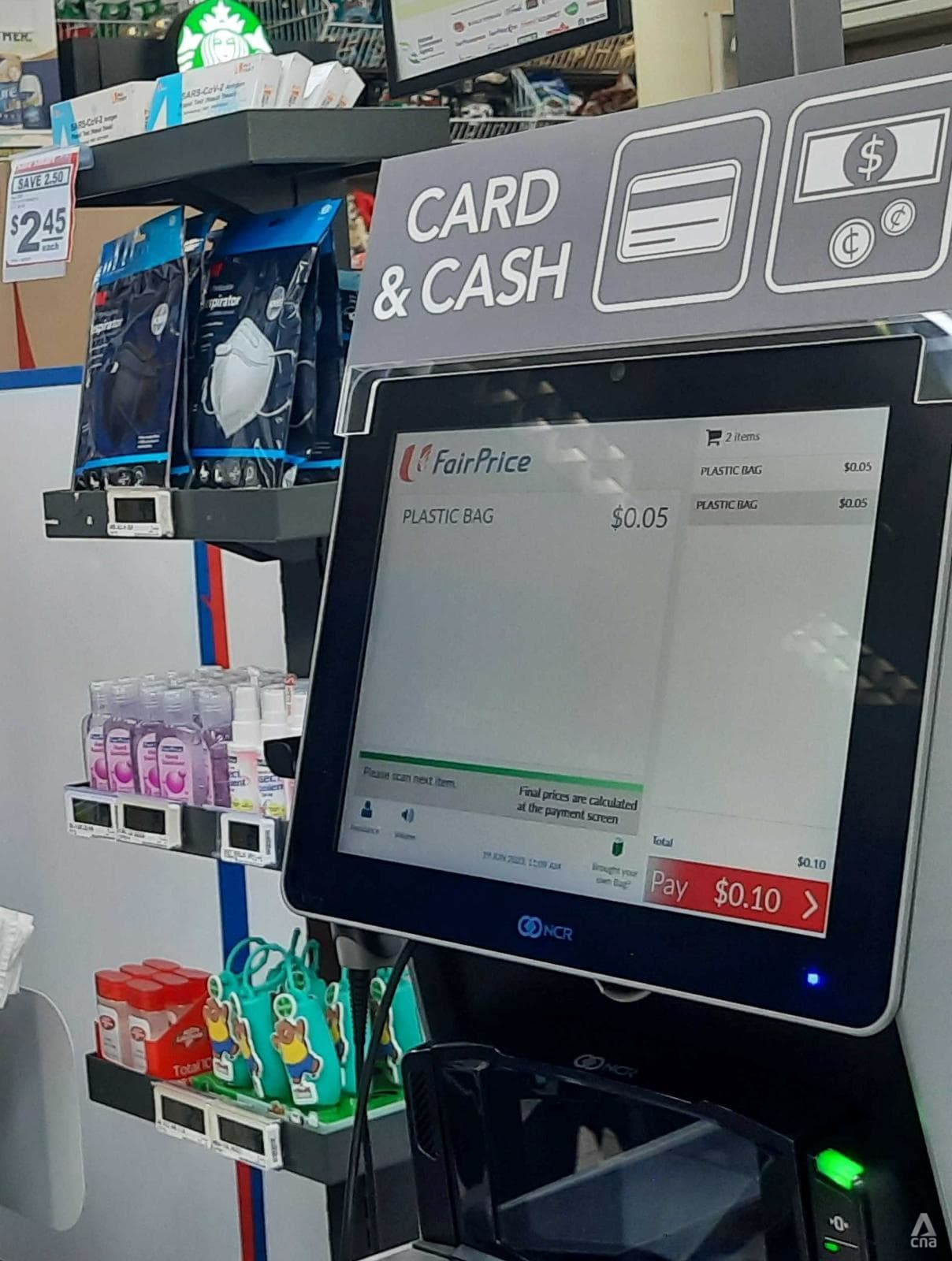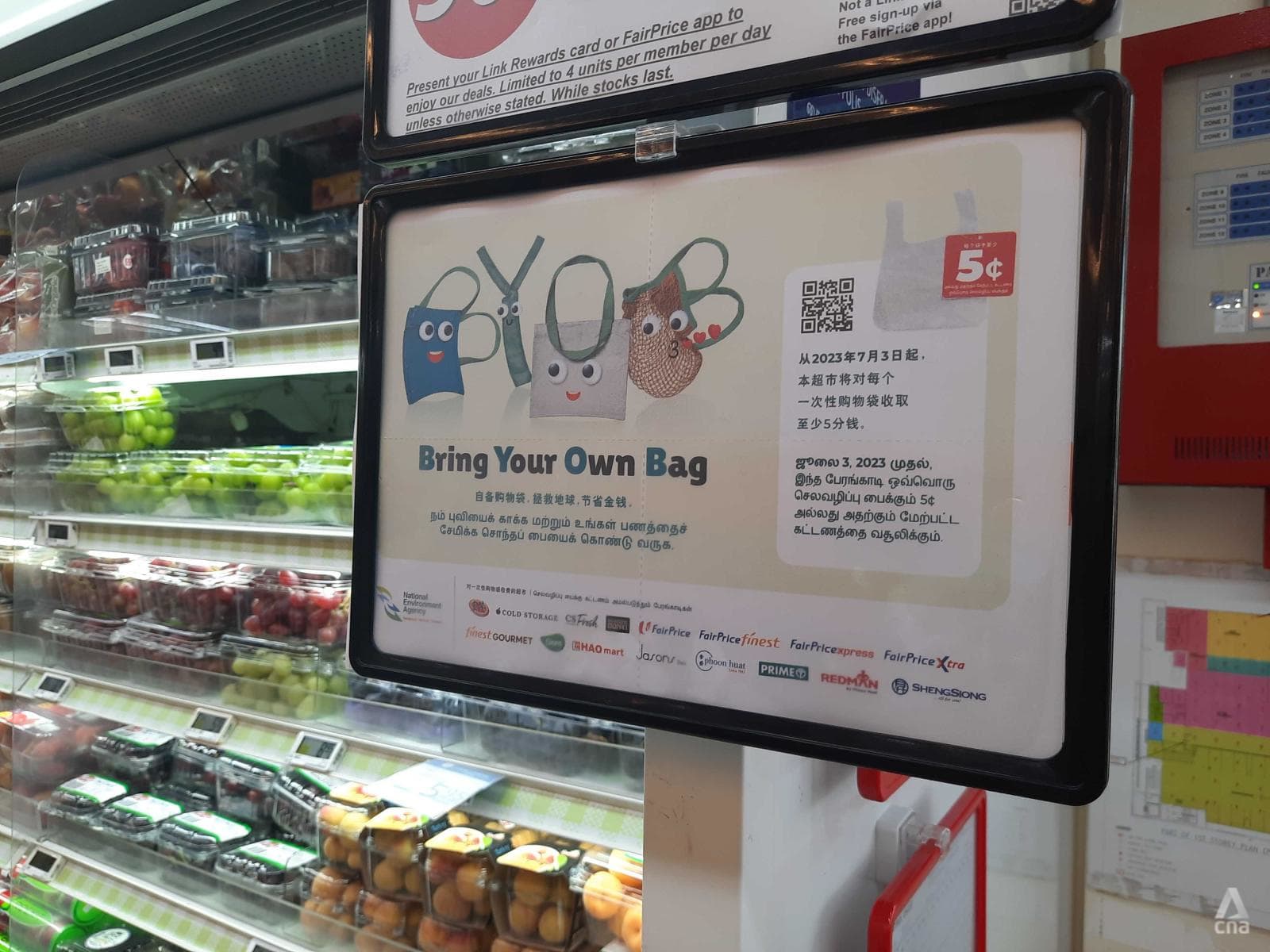'Based on honour system': Barcodes at FairPrice self checkouts for customers to scan for plastic bag payment
"We believe that by and large, customers will do the right thing," said FairPrice Group chief sustainability officer Chan Tee Seng.
SINGAPORE: NTUC FairPrice is counting on an "honour system" at its self-checkout counters when the mandatory disposable carrier bag charge kicks in on Jul 3.
Customers at these counters will have to scan a barcode placed on the monitors to pay for the plastic bags they take.
The system was shown to the media on Monday (Jun 19) at the FairPrice outlet at HomeTeamNS Bukit Batok, where supermarket staff gave Senior Minister of State for Sustainability and the Environment Amy Khor a preview of what to expect ahead of the disposable carrier bag charge.
NTUC FairPrice and other large supermarket operators with an annual turnover of more than S$100 million (US$74.7 million) will be required to charge at least 5 cents per disposable carrier bag, in a push towards sustainability. This will apply to about 400 outlets or two-thirds of all supermarkets in Singapore.
FairPrice Group will charge a flat 5-cent fee for each bag regardless of size, and across all its outlets, including convenience stores Cheers and FairPrice Xpress.
The fee will not apply to non-carrier bags such as flat-top plastic bags for fresh produce, meat or seafood.
Speaking to the media on Monday, Dr Khor said: "This is really an important step in reducing disposables ... in our journey towards a zero waste nation.
"And indeed, we hope that shoppers will be more mindful of the number of disposable carrier bags that they take, and in fact better still, we hope that Singaporeans will inculcate the habit of bringing their own reusable bags."
For checkout counters, a barcode will be placed at the corner of every monitor of each station. Customers will have to scan the barcode for each plastic bag they take, and the payment will be reflected on their receipts.

FairPrice Group's chief sustainability officer Chan Tee Seng said the system will largely work on trust, with customers expected to scan the barcode as needed.
Asked if there was any measure to ensure customers pay for the plastic bags they take, Mr Chan said: "For now we want to focus on making it seamless, easy, not too bureaucratic, which is why we have decided to implement an honour system.
"So we will allow the customers to scan the barcode themselves. If they've taken five bags, they scan it five times, and we believe that by and large, customers, many of our customers, will do the right thing."
Staff who man the self-checkout counters will also remind customers to scan the barcode if they fail to do so.
NTUC FairPrice expects the checkout process at its cashier counters to be slower initially.
"Initially there (will be) a slight increase in the transaction time. But I think over time that will (smoothen) out ... we do hope that the customers will hopefully understand this as we're just implementing a new system," he said.
Frontline staff have also been trained, he added.
"It's really to help empower our frontline staff who are interacting with our customers every day so that they are in a better position to understand the environmental angle and also to explain to the customers," he said.


Apart from training, the supermarket operator will also place posters at stores to remind customers about the charge, and to bring their own bags.
At the HomeTeamNS Bukit Batok outlet, a bag rack containing donated reusable bags was placed for customers who needed them for their purchases, as part of the Bring Your Own Bag initiative.
"So anyone who forgets to bring the reusable bags can actually use the bags from the bag racks or if they don't have enough they can also use the bags from the bag racks," said Dr Khor.
Currently available at only several FairPrice outlets, the initiative may be rolled out to all outlets islandwide progressively.
NTUC FairPrice first introduced a plastic bag charge at selected outlets in September 2019, when seven selected supermarkets and convenience stores charged customers between 10 cents and 20 cents per transaction for plastic bags.
In 2022, the initiative was implemented across all 178 Cheers and FairPrice Xpress convenience stores and 11 FairPrice supermarkets.
The supermarket operator said it saved 57 million plastic bags in 2022 from its "No Plastic Bag" initiative.
OTHER PACKAGING INSTEAD OF PLASTIC BAGS FOR TRASH
Asked how Singapore's efforts for a greener future measured against other countries, Dr Khor said: "I think that we need to work on this, taking into account the context of what we're doing."
She said Singapore has been looking at how it manages waste and has been educating and encouraging residents to reduce waste.
Singaporeans generally bagged their trash before disposal for hygiene purposes, she noted.
"So, what we have done here really is to encourage residents ... to reduce the number of disposable carrier bags that they use in order to do their part for the environment," she said.
Instead of disposable carrier bags, there are other ways to bag rubbish, said Dr Khor. For instance, repurposing packaging from other products, such as toilet roll bags and rice bags.
















